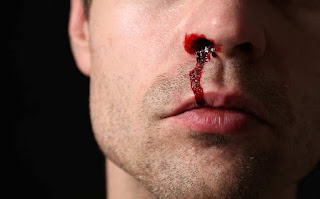NOSEBLEED
Nose bleeding causes panic among patients and relatives, but mostly is not a serious issue. Usually it stops with proper first aid.
Nasal bleeding can occur at any age. The usual causes of nose bleeding in children are trauma and nose picking. In adults, increased blood pressure can cause spontaneous nasal bleeding. Other causes of nasal bleeding in adults include trauma, as in road traffic accidents, contact sports or direct blow on the nose. It can also happen due to climate changes as in cold and dry weather. Change in ambient air pressure while travelling in flights can also cause nasal bleeds. Rarely, it can be caused by various nasal tumors, polyps or infections. It can occur during postoperative periods following various nasal surgeries.
 |
| Nose bleed |
Based on the site of bleeding,it can be divided into two types,
i) Anterior nasal bleeding- these are the most common types of nasal bleeding (90 percent of cases).The bleeding occurs mostly from the arteries of the anterior most part of nasal septum and is relatively easy to control.
ii)Posterior nasal bleeding- this bleeding is caused by blood vessels in the back part of the nose, and blood trickles down the back of the throat. It is more common in adults and might require nasal packing or further endoscopic evaluation.
Why is the nose prone for bleeding?
Nasal mucosa has a rich blood supply from major blood vessels.
During breathing dry air can lead to dryness of nasal mucosa and crusting. The removal of these crusts can lead to nasal bleed.
It takes the brunt of sudden variations of temperature, humidity and pressure.
Nose being the most prominent part of the face has higher chances of impact during a trauma.
Following trauma, depending on the nature and impact, nasal bleeding can be associated with pain over the area, nasal bone fracture,external nasal injury or swelling of nose. Clear watery discharge following severe head trauma needs immediate medical attention as it could be due to fracture of bone between nasal cavity and brain.
How to stop nasal bleeding?
What to be done at home?
Don't panic- most nasal bleeding can be managed from home with proper first aid technique.
Sit down, bend forwards, apply firm pressure by pinching the nose and wait patiently for 10 minutes. Place your thumb on one side and forefinger on the other side of the nose and pinch the soft part of the nose just above the nostrils against the septum. This area corresponds to Little's area, the area where many blood vessels meet over the nasal septum inside the nose. Donot repeatedly rub the nose to check for stoppage of bleeding. Applying ice pack over the root of the nose will help in reducing bleeding as it causes blood vessels to constrict. Bending forward prevents blood from trickling down through the back of your throat.
Most of the time it stops, if not repeat the same technique and contact the nearest emergency center.
Three “ P” s to control nasal bleeding are,
Pressure, Patience, Packing- first two can be done easily at home. Even though adequate pressure is applied by firmly pinching nose, patients fail to continue same for adequate time duration. It is very important to apply pressure for atleast 10 minutes duration.
What extra precaution to be taken in children?
In children, do not allow them to lean back, as this can cause blood to get into the airway and cause breathing difficulty or if swallowed unknowingly it can cause nausea and vomiting. The correct technique can be demonstrated and taught to children which can be helpful especially when they are alone or when parents are not around them.
What happens in the hospital?
The doctor will demonstrate to you the correct technique of applying pressure to stop nasal bleeding. And if the bleeding doesn't stop, endoscopic evaluation is done to look for bleeding sites and control them by chemical swab or a nasal cautery.
Nasal packing-
If bleeding blood vessels cannot be identified and the bleeding is not controlled, the doctor might do nasal packing to control further bleed. Patients following nasal packing usually complain of sensation of stuffy nose, headache, dryness of mouth as you breathe through your mouth. The nasal pack can get soaked with nasal secretions over time.
What If the nasal bleeding doesn't get controlled?
If the bleeding cannot be controlled by all these measures and nasal packing, the doctor will discuss with you other invasive surgical procedures like occluding bleeding blood vessels with chemicals (embolisation) or ligating the blood vessels.
Liver disease, chronic alcohol consumption, kidney disease and patients with bleeding disorders can present with frequent nasal bleeds. Some of the medications, especially blood thinning drugs like Ecospirin can increase the risk of nasal bleeding.
Frequent nasal bleeding needs to be evaluated for bleeding disorders, for any nasal anomaly like deviated nasal septum or for any other serious conditions.
In children, blood stained foul smelling nasal discharge could be due to foreign body in the nose, as initially it is not noticed and later it gets infected over time.
How to prevent nasal bleeding episodes?
Avoid repeated blowing of your nose. It is advisable to apply local moisturizer over the crusted and dry anterior part of your nasal septum. Discourage your children from nose picking and trim nails short which will help in reducing trauma.
Photo courtesy-Google Images (Getty images)
Awesome 💯💯Well Professional
ReplyDelete👍 thanks
DeleteGreat work sir!
ReplyDeleteReally helpful!!
🙂🙂
Thank you doctor🙏
DeleteImportant queries addressed.good write up!!!
ReplyDeleteVery informative. Please continue writing on more topics
ReplyDeleteThankyou..thanks for the support
DeleteGreat work sir.. really helpful
ReplyDeleteExpecting more articles
Thank you sir
ReplyDelete